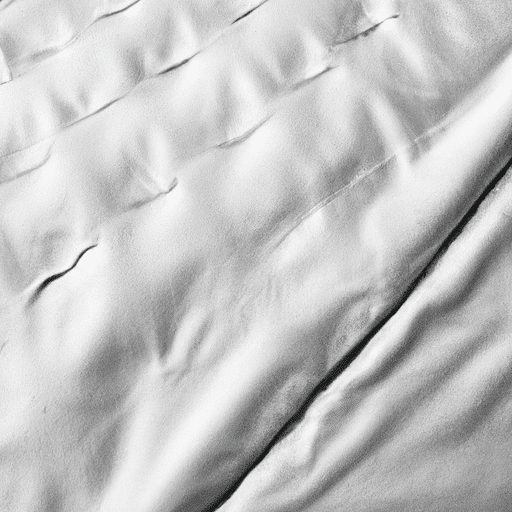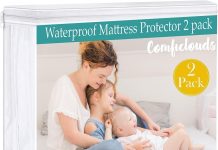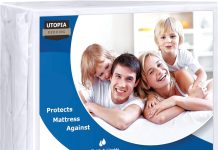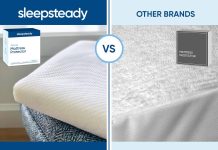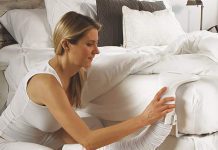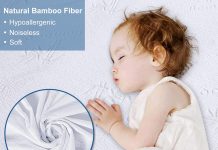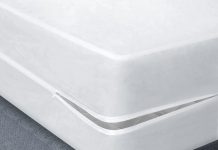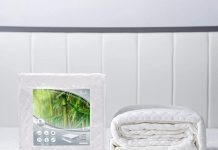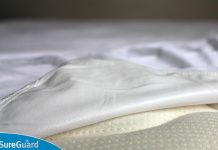Looking for the perfect mattress protector but not sure where to start? We’ve got you covered! In this article, we will guide you through the process of selecting the right mattress protector that suits your needs and preferences. Say goodbye to those late-night spills and pesky allergens – with our expert tips and advice, you’ll be sleeping soundly in no time. So, let’s jump right in and discover how to choose the ideal mattress protector for a blissful night’s sleep.
Review contents
Consider the Material
When choosing a mattress protector, one of the first factors to consider is the material it is made of. There are several options available, each with its own benefits. Two common materials to consider are waterproof and water-resistant protectors. Waterproof protectors provide an impenetrable barrier against liquid spills, stains, and accidents. They are especially useful for individuals with young children or pets. On the other hand, water-resistant protectors repel liquid to a certain extent, providing some protection against spills and accidents, but not completely blocking them.
Another important aspect to consider is breathability. A mattress protector with good breathability allows air to circulate, preventing the buildup of heat and moisture. This is especially important for those who tend to sleep hot or live in warmer climates. Look for protectors made from materials such as cotton or bamboo, which are known for their breathability.
Hypoallergenic materials are also worth considering, especially for individuals with allergies or sensitivities. These materials are designed to resist allergens such as dust mites, mold, and dander, providing a healthier sleep environment. Look for protectors that are labeled hypoallergenic or made with materials like natural latex or organic cotton.
Noiseless materials are also important to ensure a peaceful sleep. Some mattress protectors can be noisy and cause discomfort every time you move. Look for protectors made from materials that are noiseless, such as cotton or microfiber.
Softness and comfort are also key factors to consider. You want a mattress protector that feels comfortable against your skin and doesn’t alter the overall feel of your mattress. Look for protectors made from soft and smooth materials like cotton or bamboo.
Lastly, durability is an important consideration. You want a mattress protector that will last for a long time and withstand regular use and washing. Look for protectors made from high-quality materials and pay attention to customer reviews mentioning durability.
Determine the Size
To ensure a proper fit, it is crucial to measure your mattress before choosing a mattress protector. Mattresses come in different sizes such as twin, full, queen, king, and California king. Measure the length, width, and height (or depth) of your mattress to determine the correct size.
Check the depth of your mattress as well. This measurement is especially important for thicker mattresses or ones with added mattress toppers. Make sure the mattress protector you choose has enough depth to accommodate your specific mattress.
Also, consider mattress topper compatibility if you use or plan to use a mattress topper. Some mattress protectors are designed to fit over both the mattress and topper, while others may not have enough stretch or depth to properly accommodate a topper. Take this into account when selecting a mattress protector.
Evaluate the Fit
The fit of a mattress protector is crucial to its effectiveness. An ill-fitting protector may slip off during the night, leaving your mattress exposed and vulnerable. There are a few key aspects to consider when evaluating the fit of a mattress protector.
Fitted sheet-style protectors are designed to mimic the fit of a regular fitted sheet. They have elasticized corners and wrap snugly around the four corners of your mattress. This style is easy to install and provides a secure fit.
Elasticity and secure fastening are also important factors. Pay attention to the quality of the elastic bands and how well they hold the protector in place. Look for protectors with reinforced elastic or adjustable straps for a secure fit.
Some protectors come with corner straps or anchor bands. These additional straps attach to the corners of the mattress, providing extra security and preventing the protector from shifting or coming loose.
A wraparound design is another option to consider. These protectors encase the entire mattress, similar to a fitted sheet, providing a seamless fit and ensuring full coverage.
Consider Care and Maintenance
When choosing a mattress protector, it’s important to consider the care and maintenance involved. Look for protectors that are machine washable for easy cleaning. This allows you to regularly wash away dust, allergens, and spills, keeping your mattress protector clean and fresh.
Check if the protector is suitable for tumble drying or line drying. Different protectors have different care instructions, so make sure the care instructions align with your preferences and lifestyle.
Stain-resistance is another key consideration. Opt for protectors that have stain-resistant properties. These protectors are designed to repel spills and stains, making it easier to keep your mattress protector clean and in good condition.
Easy removal and installation is another factor to evaluate. Look for protectors that are easy to remove and put back on your mattress, as this will make cleaning and maintenance much more convenient.
Assess the Protection Level
A mattress protector should provide more than just comfort; it should also offer protection against various potential threats. Here are some important aspects to consider when assessing the protection level of a mattress protector.
Liquid and stain protection is essential for keeping your mattress clean and looking new. Look for protectors that have a waterproof or water-resistant barrier to ensure that spills, accidents, and liquid stains do not seep through to your mattress.
Dust mite resistance is important for individuals with allergies or asthma. Look for mattress protectors that have a dust mite barrier, preventing these microscopic pests from infesting your mattress.
Bed bug protection is essential if you live in an area with a high prevalence of bed bugs. Look for mattress protectors that have been specifically designed to keep bed bugs at bay.
Allergen barriers are also beneficial for those with allergies. Look for protectors that offer protection against allergens such as pet dander, pollen, and dust.
Check for Certifications
When choosing a mattress protector, it’s worth considering if it has any certifications. These certifications validate the quality and safety of the product. Here are a few key certifications to look out for:
The OEKO-TEX Standard 100 certification ensures that a product has been tested for harmful substances and is safe for human use. Look for mattress protectors that have this certification to ensure they are free from harmful chemicals.
The Greenguard Gold certification guarantees that a product has low chemical emissions and is safe for use in environments such as schools and healthcare facilities. Look for mattress protectors with this certification, especially if you have respiratory conditions or sensitivities.
The GOTS (Global Organic Textile Standard) certification verifies that a product is made from organic fibers and adheres to strict environmental and social criteria. Look for mattress protectors with this certification if you prefer organic and environmentally-friendly products.
Consider the Warranty
When investing in a mattress protector, it’s always a good idea to consider the warranty. Here are a few key factors to evaluate:
Check the length of the warranty. A longer warranty period generally indicates that the manufacturer has confidence in the durability and quality of the product.
Review the coverage details. Make sure you understand what is covered under the warranty, such as manufacturing defects or damage caused by regular use.
Consider the return policy. Look for mattress protectors that offer a satisfactory return policy in case you are not satisfied with the product. A good return policy gives you peace of mind and the option to make an informed decision.
Read Customer Reviews
To gather insights and experiences from other customers, reading customer reviews is highly recommended. Here are some valuable tips to help you navigate customer reviews effectively:
Check online retailers that sell the mattress protector. Websites such as Amazon often have customer reviews that provide detailed feedback on various aspects of the product.
Visit manufacturer websites as they often feature customer reviews and testimonials. These reviews can provide insight into the quality and performance of the mattress protector.
Look for reputable review websites that specialize in testing and reviewing sleep products. These websites often provide unbiased and in-depth reviews based on rigorous testing protocols.
Compare Prices
When choosing a mattress protector, it’s important to set a budget and compare prices. Here are some key aspects to consider:
Set a budget before you start comparing prices. Determine how much you are willing to spend on a mattress protector and stick to that budget.
Compare the features of different mattress protectors within your budget range. Look for protectors that offer the desired level of protection, fit, and material quality.
Consider the long-term value. A higher-priced protector that offers superior protection and durability may be a better investment in the long run compared to a cheaper alternative that needs to be replaced more frequently.
Consider Personal Preferences
In addition to the technical considerations, it’s essential to take personal preferences into account when choosing a mattress protector. Here are a few factors to consider:
Heat regulation is important for individuals who tend to sleep hot. Look for mattress protectors that have moisture-wicking properties and promote airflow to keep you cool and comfortable throughout the night.
Noise level can affect your sleep quality. If you’re a light sleeper or easily disturbed by sounds, opt for a mattress protector that is noiseless and doesn’t produce any crinkling or rustling noises.
Ease of installation is another personal preference to consider. Some mattress protectors are easier to put on and take off compared to others. If you anticipate frequently removing and re-installing the protector, choose one with a convenient design.
Consider the style and aesthetic of the mattress protector. While this may not affect functionality, it’s worth choosing a protector that matches your personal taste and complements your bedroom decor.
By considering all of these factors, you can choose the right mattress protector that meets your needs and preferences, ensuring a comfortable and protected sleep surface for years to come. Happy shopping!

